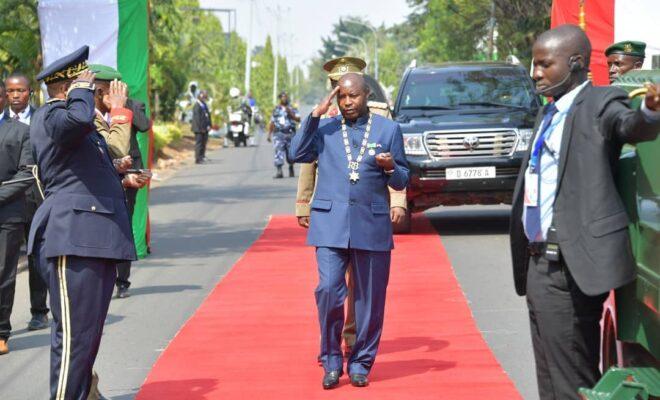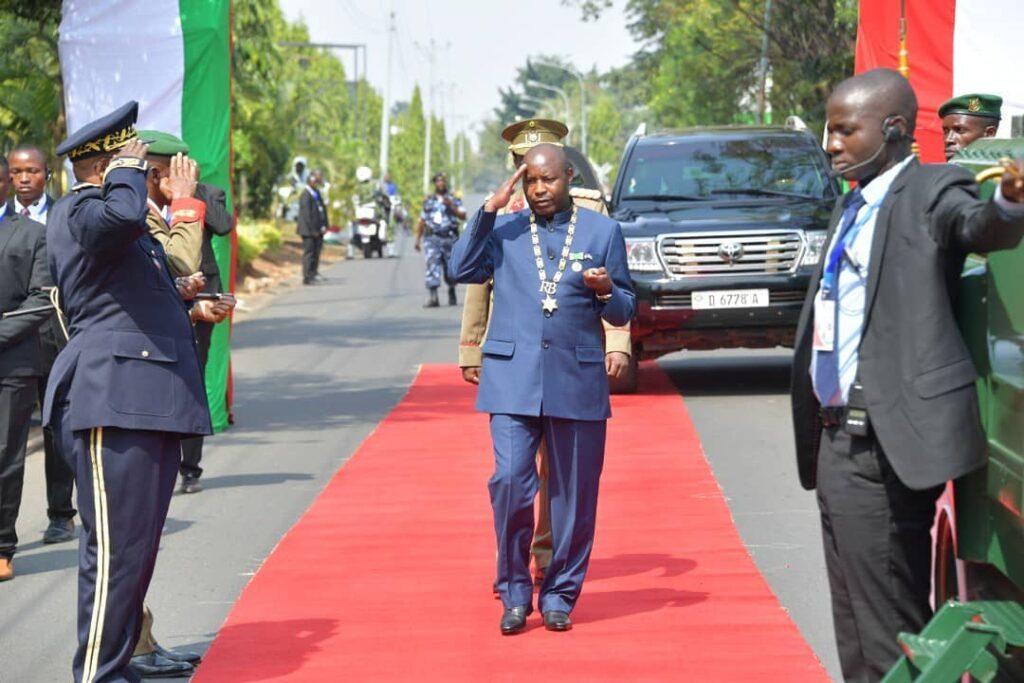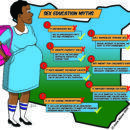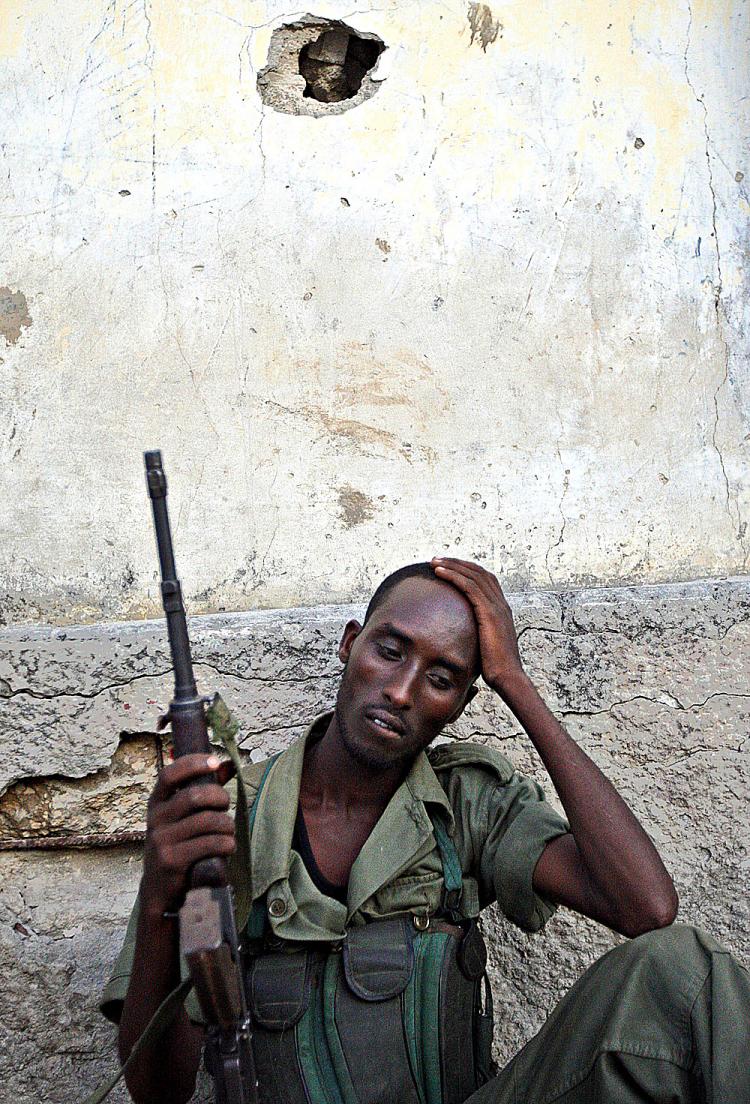Burundi: How different is President Ndayishimiye?

After Nkurunziza’s dark final years, opposition members, journalists and activists note signs of light from the past year, but remain cautious.

Evariste Ndayishimiye inherited an abusive and internationally isolated country in 2020. Credit: Evariste Ndayishimiye.
At his inauguration on 18 June 2020, the newly-elected Evariste Ndayishimiye vowed to follow in the footsteps of his late predecessor and “preserve and promote the independence, love of the fatherland and equitable development achieved by HE Pierre Nkurunziza”. At the same time, he promised to build Burundi on the foundations of “good governance, respect and protection of human rights”.
Many Burundians listening to this were unsure what to expect of their first new president in 15 years. For them, these were two contradictory messages. From 2015, when former President Nkurunziza had decided to run for a third term, widely considered to be unconstitutional, his reign became defined by human rights abuses. In the final years of his presidency, an estimated 1,700 people were killed, hundreds of thousands fled, numerous media houses were shut down, and the country found itself isolated by foreign donors and many of its neighbours.
Would Ndayishimiye, the man Nkrunziza endorsed to succeed him, continue this legacy or break with it? Over a year into his presidency, many Burundians are hopeful about the direction the country is going in but maintain some significant concerns.
Reining in abuses at home
Since coming to office, President Ndayishimiye has promised to respect people’s freedoms and, this June, repeated a warning to authorities to act fairly when applying the law. “I refuse to allow a situation in which tomorrow people say Ndayishimiye’s government protected criminals because they belong to the same family or ethnic group or are affiliated with the presidential party,” he said.
According to Sixte Vigny Nimuraba, chair of the Independent National Commission for Human Rights (CNIDH), this rhetoric been followed up with some action. He says that “relations between Burundians have not been good over the past years” but that they are improving.
Jimmy Nahimana, a member of the opposition party Congrès National pour la Liberté (CNL), has been particularly relieved by changes in the behaviour of Imbonkerakure, the ruling CNDD-FDD party’s youth wing. Under Nkurunziza, this group acted as a militia and was responsible for widespread violence against political opponents. Now, the notorious youth group has been reined in and they have reportedly been told by the government not to interfere in security matters.
“In the past, the Imbonerkaure acted like a security force. They perpetrated crimes and enjoyed total impunity. They were more powerful than the administrative authorities and security forces,” says Nahimana. “Their new behaviour greatly surprises me. I didn’t think that they can live peacefully with people not affiliated with the ruling party.”
Many journalists in Burundi also note promising progress. Ndayishimiye has lifted sanctions against local media groups Iwacu and Ikiriho and international broadcasters such as the BBC and Radio Sans Frontières Bonesha FM. In December 2020, he pardoned four journalists who were serving two and a half years sentences for “attempted complicity in endangering state security”.
According to Léandre Sikuyavuga, director of Iwacu Press Group, these actions have rebuilt some of the trust that was destroyed under Nkurunziza. He says that some authorities and ruling party youths still limit journalists’ access to some areas, but that officials grant information to journalists even when they work for outlets perceived to be critical of the government. The media environment is still far from perfect, says Sikuyavuga, but “overall, the current government has a good track record compared to the previous regime”.
Armel Niyongere, chair of Christian Action for the Abolition of Torture, is similarly cautious in his appraisal. He applauds the new president’s recent pardon 5,000 inmates – about 40% of Burundi’s prison population – to help relieve overcrowded jails. However, he also emphasises that Ndayishimiye has a long way yet to go in undoing his predecessor’s dark legacy.
“Many political prisoners who fought against the illegal third term of Pierre Nkurunziza are still languishing in prisons,” says Niyongere. Many exiled politicians, activists and journalists who were sentenced to life imprisonment in absentia are also still “afraid of returning home”. Even more worrying, Niyongere says that dead bodies are still showing up across the country, citing figures from SOS-Torture/Burundi which recorded 563 bodies in this first year of Ndayishimiye’s regime.
Repairing foreign relations
The new president is also attempting to reverse course on his predecessor’s foreign policy. By the time Nkurunziza left office, Burundi was a pariah state and isolated by most regional governments and donor countries. This too has started to shift.
While Nkurunziza only made a single foreign trip in his final five-year term – travelling to closely allied Tanzania – Ndayishimiye has made several diplomatic visits to the likes of Kenya, Egypt, the Democratic Republic of Congo, Equatorial Guinea, and Central African Republic as well as Tanzania. Due to the improved stability and security, the UN Security Council removed Burundi from its agenda in December 2020, noting that “the generally peaceful elections have marked a new phase”. And since February, the European Union (EU) has begun meeting with the Burundian government to discuss restarting the financial support it suspended in 2016.
The Burundian government has welcomed these rapprochements, but several groups have warned against moving too fast. In an open letter published in June, twelve Burundian and international human rights organisations warned the EU of a “lack of meaningful progress on the human rights situation and widespread impunity for past and ongoing serious human rights abuses in the country…despite a series of recent isolated acts by the Burundian government”. They called on the EU not to rely on the government’s “promises of human rights reforms” but rather “insist that they meet concrete criteria”.
One key concern highlighted by many activists is that several hardliners from Nkurunziza’s time still wield significant influence. Prime Minister Alain-Guillaume Bunyoni and Minister of the Interior Gervais Ndirakobuca, for instance, are under Western sanctions due to their alleged role in violently suppressing protests. Their prominent roles are seen by some as evidence that the new government is merely a continuation of the same system, while others suggest that these figures could obstruct cooperation with the EU to protect themselves.
Despite some positive progress that might have seemed unthinkable a few years ago, Burundi still has far to go in breaking from Nkurunziza’s final years. There are many interlinking factors and vested interests that will determine how far Burundi will change, but according to political scientist Guillaume Ndayikengurutse, this fate rests largely on one man. “It’s not worth focusing on a few people,” he says. “The President of the Republic has great power, as long as he uses it.”







[…] Source link : https://africanarguments.org/2021/08/burundi-how-different-is-president-ndayishimiye/ Author : Lorraine Nkengurutse Publish date : 2021-08-06 10:05:21 Copyright for syndicated content belongs to the linked Source. Tags: BurundiNdayishimiyePresident Previous Post […]
[…] give some Burundian journalists a sense of cautious optimism, as Lorraine Nkengurutse explains in African Arguments. While hundreds of inmates have been pardoned, some political prisoners remain behind bars. Press […]
[…] give some Burundian journalists a sense of cautious optimism, as Lorraine Nkengurutse explains in African Arguments. While hundreds of inmates have been pardoned, some political prisoners remain behind bars. Press […]
[…] give some Burundian journalists a sense of cautious optimism, as Lorraine Nkengurutse explains in African Arguments. While hundreds of inmates have been pardoned, some political prisoners remain behind bars. Press […]
[…] give some Burundian journalists a sense of cautious optimism, as Lorraine Nkengurutse explains in African Arguments. While hundreds of inmates have been pardoned, some political prisoners remain behind bars. Press […]
[…] journalistes burundais un optimisme prudent, comme l’explique Lorraine Nkengurutse dans Arguments Africains. Alors que des centaines de détenus ont été graciés, certains prisonniers politiques restent […]
Hiya, I’m really glad I have found this info. Today bloggers publish just about gossips and net and this is really annoying. A good website with exciting content, that is what I need. Thank you for keeping this web-site, I will be visiting it. Do you do newsletters? Cant find it.
[…] give some Burundian journalists a sense of cautious optimism, as Lorraine Nkengurutse explains in African Arguments. While hundreds of inmates have been pardoned, some political prisoners remain behind bars. Press […]